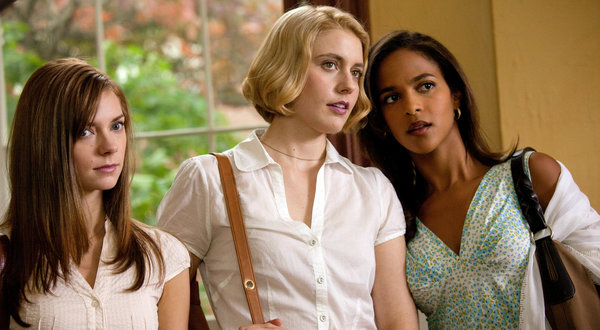Movie review by Greg Carlson
Whit Stillman’s feature debut “Metropolitan,” which received an Academy Award nomination for its screenplay, is an object of love and desire for a cultish collection of cinephiles who came of age in the early 1990s. Many of those fans, having waited fourteen years (the date of “The Last Days of Disco”) for new Stillman, may be slightly let down by “Damsels in Distress,” a comedy so willfully detached from dreary reality its attitude, manner, and appearance resemble a nostalgia-burnished relic from the New Frontier. Like Stillman’s previous work, “Damsels” explores the milieu of the “urban haute bourgeoisie,” tagging along behind a trio of coeds and their new recruit as the young women embark on a Sisyphean quest to systematically improve the caliber of decorum and etiquette practiced by their unwashed, uncouth male classmates.
In his essay on “Metropolitan” for the Criterion Collection, Luc Sante wrote that the “dialogue is ostentatiously written; every character wields subordinate clauses and uses words like however and nevertheless. The combination of stilted speeches and deft behavioral acting sometimes seems peculiar, but it is also peculiarly apposite. Like Austen, Stillman wears his irony lightly and deploys it affectionately.” While the stilted speeches and behavioral acting continues to express Stillman’s inimitable voice in “Damsels in Distress,” the relevance, pertinence, aptness, and affection have gone missing along with the Austen-esque light ironic touch. Instead, “Damsels” is Stillman at his broadest.
Critic Andrew O’Hehir praises “Damsels” for being “deliberately and purposefully irrelevant,” but where “Metropolitan” emotionally invested in a protagonist whose anxieties reflected self-doubts recognizable to all, “Damsels” presents a group of privileged young people whose earnestness obscures any alternative agenda Stillman might hope to develop. Stillman, as ever, can be delightfully funny, and Greta Gerwig and the other performers are game. At issue is whether the viewer is meant to laugh with or at these characters, whose shallow observations are as convincing as Gerwig’s goal to launch a widespread dance craze.
With Stillman, archness and pretense are traditionally viewed as assets, but “Damsels” could use the savage and critical intelligence of Stillman regular Chris Eigeman, sadly missing from the cast. Thankfully, Taylor Nichols merits a fleeting cameo appearance as a professor, but “Damsels” eschews the kind of acid-tongued observer who explodes the vacuum created by the moronic fellows identified by such gags as lifelong failure to learn the names of colors. Frankly, “Revenge of the Nerds” more successfully lampooned the depleted inanity of Greek life on college campuses. At his fictional Seven Oaks, Stillman travels some of the same pathways as the Alpha Betas of Adams, jabbing and poking at how frat boys demonstrate enthusiasm for parodies of Olympic contests matched only by their dubious resistance to hygiene.
It would be hazardous to imagine that Stillman wholly detests the well-meaning but naïve and ineffectual young women questing to make the world a better place through tap dance therapy and shifts at the campus suicide prevention center, but much of the movie depends on the artificial barrier erected to prevent glimpses of recognizable, uncalculated expressions of genuine feelings. That aggravating approach to character makes one wonder how much respect the filmmaker has for his audience.
